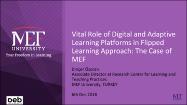Please use this identifier to cite or link to this item:
https://hdl.handle.net/20.500.11779/968| Title: | The Vital Role of Digital and Adaptive Learning Platforms in a Flipped Learning Approach | Authors: | Dinçer, Özoran | Keywords: | Flipped Learning Digital and Adaptive Platforms |
Publisher: | OEB Global | Source: | Ozoran, D. (December 6, 2018). The vital role of digital and adaptive learning platforms in a flipped learning approach. OEB Global 2018. | Abstract: | Flipped Classroom also referred as Flipped Learning is beneficial for because: It gives students the chance to expose to content before-class, as long as they want, when they want, and where they want, giving more control on the pace of consuming the content until they feel comfortable. Students are pre-exposed to the content before class where they work on basics of the content (lower levels of Bloom’s taxonomy), during the time saved from these basic knowledge transfer students can work more on the higher order learning (as referred in Bloom’s Taxonomy) with the help of the active learning in-class activities. Problem of Flipped Learning From Instructors side both preparing engaging pre-class content and in-class activities are highly demanding. More content and more activities means more need for more checkpoints on student understanding and skills development in the process, which also means creating more questions, more answers, doing more scoring and giving more feedback. From students side, while the pace and timing of the learning are customizable, the learning path, i.e. the questions students answer and the content provided are mostly same. There is not much occasion for personalization for individual learning experience. In most flipped learning designs pre-class activities also leave students alone, sometimes directly defined as “individual working space”, makes it highly challenging for students especially when they are totally stranger to a content and need immediate assistance and feedback. Flipped Learning coupled with Digital and Adaptive Learning Platforms offered by top textbook publishers has big impact on overcoming the mentioned problems. Digital and Adaptive Learning Platforms offer huge amount of highly rich content. Text, videos, questions, answers, etc… Instructors no longer spend time on repetitive tasks such as preparing questions, creating answers, solutions, grading, basic feedback and also lecturing. They can more focus on creating authentic in-class tasks and providing just-in-time and complex individual feedback to make sure the students are engaged and develop persistent skills. Will Digital and Adaptive Learning Platforms replace instructors? Probably not in the near feature. These platforms can be seen as cognitive assistants which automate repetitive tasks and personalize student learning experience by its computational power. With the help of these platforms Instructors will become more curators of the rich content provided and will focus more on creative aspects of the learning experience, such as authentic problems, cases, projects, etc. At MEF University, where flipped learning is embraced as institutional instructional philosophy including all Faculties and all Departments, we begin to complement our flipped learning approach with Digital and Adaptive Learning Platforms with a pilot period beginning from Spring 2017-2018. We will share our experience and take outs from this transition process including technological challenges and perspectives from students and instructors. | URI: | https://hdl.handle.net/20.500.11779/968 |
| Appears in Collections: | CELT Koleksiyonu |
Files in This Item:
| File | Description | Size | Format | |
|---|---|---|---|---|
| OEB - Vital Role of Digital and Adaptive Learning Platforms in Flipped Learning Approach.pdf | Sunum Dosyası | 4.11 MB | Adobe PDF |  View/Open |
CORE Recommender
Page view(s)
32
checked on Nov 18, 2024
Download(s)
10
checked on Nov 18, 2024
Google ScholarTM
Check
This item is licensed under a Creative Commons License
